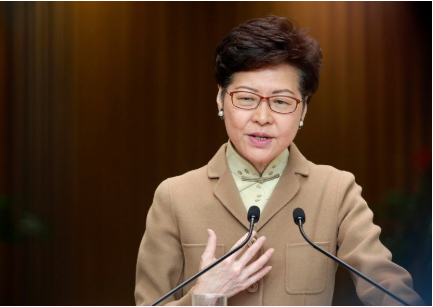The principle that ensures Hong Kong enjoys freedoms unavailable in mainland China can continue beyond its 2047 expiry date as long as the city’s youngsters do not destroy it with “temporary misunderstandings,” Chief Executive Carrie Lam said on Thursday.
The Chinese-ruled city, roiled by months of pro-democracy protests fueled by perceptions that Beijing is tightening its grip, was handed over to China by Britain in 1997 under a “one country, two systems” framework valid for at least 50 years.
Beijing denies meddling there, says it is committed to the principle, and blames the West for fomenting unrest.
The handover agreement states that the Asian financial hub is part of Communist-ruled China, but is assured freedoms such as those of expression and assembly, plus a different institutional framework, including an independent judiciary.
The protests escalated in June over a now-dead bill that would have allowed suspects to be extradited to the mainland for trial in courts controlled by the Communist Party, but have since evolved into a broader pro-democracy movement.
“There is enough reason to believe ‘one country, two systems’ … will not change after 2047,” Lam said in her first appearance in the city’s Legislative Council this year.
She said the understanding and the implementation of the principle required maintaining the “foundation of one country” and respecting the difference “of two systems.”
Lam urged the city’s youngsters, which have been at the forefront of the often-violent protests, to not violate the principle because of “temporary misunderstandings.”
“The scenario they worry about today may be triggered by their own hand,” Lam said.
Hong Kong’s protest movement is supported by 59% of city residents polled in a survey conducted for Reuters by the Hong Kong Public Opinion Research Institute in December. Only 17% expressed support for seeking independence from China.



